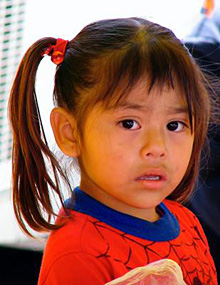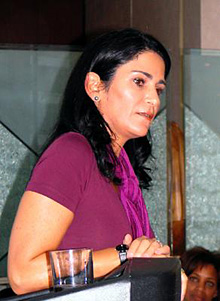 |
 |
 |
 Editorials | March 2007 Editorials | March 2007  
Lydia's Rescue: Human Rights Activist Gets Too Close to the Mob
 Troy Turner - The Daily Times Troy Turner - The Daily Times


| | A young girl tries to sell homemade crafts at a street booth in Mexico City. It is girls like this who often are nabbed and become victims of abuse, and Mexican journalist Lydia Cacho (below) risks her life to help them. (Troy Turner/The Daily Times) | 
|
Mexico City — Lydia Cacho is considered the rock star of Mexican journalism.

Mexican mafia and corrupt officials, however, consider her a dangerous threat.

She was seized, beaten at gunpoint, and was walked into the ocean for what she thought was surely her murder.

She believes she was saved only by a surprise phone call to her captors, from bosses who feared the sudden flurry of inquiries from prominent American journalist organizations. The spotlight came just in the nick of time after the Americans and other foreign journalists were tipped off about Lydia's abduction.

Today, Lydia continues to fight for abused women and children.

Yet, she knows she also remains a walking target.

A secret recording

Lydia became the subject of a worldwide human rights watch after she wrote numerous newspaper stories as a freelance journalist that revealed domestic abuses, many of them involving the sex trade using women and children. Then in 2005, she released a book, "The Demons of Eden," linking prominent businessmen to a child pornography and sex ring, including ties to high-ranking government officials.

She leans over the tape recorder and pushes "Play."

These days, sharing her story with others is what she feels keeps her alive, but equally important is the continued battle she wages against corruption and abuse.

A transcript of the tape, anonymously shared with media nationwide, made her famous in Mexico after independent claims that it included the voice of a powerful state governor. The man recorded talks about Lydia, saying that necessary steps should be taken to stop her reporting, "In order for the rest of them to learn a lesson."

The caller to the governor, believed to be involved with the Mexican mafia and also with ties to other locations such as Las Vegas and Hong Kong, tells the governor on tape that he appreciates him having Lydia arrested and tossed into jail for the claims she made in her book.

The claims include accusations that this type of corrupt men were directly involved in child pornography and child prostitution, with girls as young as 4 years old being raped.

Lydia tracked down and talked to many of the girls believed involved.

One of them named names.

Lydia printed them.

"Probably 40 percent of Cancun's investment is money laundering from all over the world," she said regarding one of Mexico's hot tourist spots, and of yet another lucrative source of corruption. "Nobody wants to touch it because it's a pot of gold."

That kind of mentality in government and business circles makes a challenge to the status quo an unpopular thing.

Lydia claims she was offered $1 million from the influenced editor of a magazine, "If I would shut up."

There were other warnings. "People in the organized crime unit of the police told me not to speak," she said.

It turns out that one of the men named by the girls and used in the book had been appointed to a ranking position in charge of federal police.

The stakes were raised.

Then in December 2005, "I was arrested," she recalled. "They took me away, without anyone knowing where I was going."

Can you swim?'

"For the first six hours, I was pretty sure I was going to die," she said in a somber voice. Her abductors who seized her from the jail took her on a 20-hour journey, holding loaded guns to her head, punching her, and making it clear she was at their mercy, of which they shared little.

Back in the jail, Lydia was warned that word was spreading she would be raped and tortured first. Those thoughts never left her as the men made sexual remarks and poked her with their guns while they laughed during the seemingly endless car ride.

They drove to an isolated spot on the ocean, made Lydia get out, and they asked her if she could swim.

They began pushing her under the water, using their guns to help hold her under.

Lydia felt the time had come.

Death seemed certain.

It was then that one of the men received an unexpected call.

"Their attitude immediately changed," she said.

They pulled her from the water, and in a remarkable about-face, they began treating her with newfound respect.

She was puzzled, and more so by what one of the men told her after the phone call, the only hint as to why she was not yet dead.

"Now you are a star," he flatly told her.

The saving blitz

Friends and colleagues of Lydia probably helped save her life when her abduction was discovered and they launched a phone blitz to various human rights and media organizations around the world. Among the calls was one to the United Nations, Lydia said, which then called the accused governor and warned him that Lydia was considered a human rights activist, and that if anything happened to her, there would be worldwide consequences.

The Human Rights Watch made a call.

The New York Times made a call.

The Dallas Morning News made a call.

One call after another came until it became clear to her oppressors that any harm brought to Lydia would bring down unprecedented media and human rights scrutiny.

Her life, at least for the moment, was spared.

A new pillar

The freedom of the press in Mexico lags far behind that enjoyed as part of the American democracy. Mexican laws make defamation a crime in most states, even if the story reported is proven true.

Add to the criminal risks of investigative journalism such dangers as the widespread level of corruption and organized crime in Mexico, and any journalist who works here to protect the freedoms of the oppressed are certain to become victims themselves.

Lydia and her story is a journalism case study of how far Mexican democracy still has to go to enjoy true liberty. But, it also is a heroic story of how far it already has struggled toward providing a pillar of justice not previously known in Mexico.

"What happened to me is happening to a lot of journalists in Mexico," she recently shared in a talk with a small foreign delegation representing the American Society of Newspaper Editors. The visiting editors were in Mexico to learn more about the many issues here that have so much impact on their own hometowns in the United States.

Lydia's story is no different. After all, the so-called global economy most certainly includes sex.

And kidnapping, drugs, murder, corruption, oppression.

"I know that they can kill me," she matter-of-factly states about the criminal underworld upset with her for talking. She finds courage, however, not just in the abuse victims she fights hard to help protect, but also in another thought that constantly ran through her head when she thought she was about to die. "I think of all my peers who are being abducted or killed in Mexico."

Now that she has the spotlight, she seems determined to use it, and any other stage tools she can borrow in America, to build something new in Mexico.

"They don't like her talking," confessed one of Lydia's colleagues, Jorge Zepeda Patterson, "but she has to talk."

"She is the rock star of Mexican journalism," proclaims Milton Coleman, deputy managing editor of The Washington Post.

Many others agree, recognizing her not just for her journalism skills, but also for her humanitarian services, which includes working to provide protective shelter for women and children, having founded the Refuge Center for Abused Women of Cancun.

Amnesty International USA is among the latest to honor her, earlier this month awarding Lydia its 2007 Ginetta Sagan Award for human rights work.

"Human rights work, especially when it challenges powerful individuals and institutions, remains extremely dangerous," said Julianne Cartwright Traylor, co-chair of the award committee.

So does being a courageous journalist in Mexico.

Lydia Cacho lives the role every day.

She is the rock star of Mexican journalism. | 
 | |
 |



